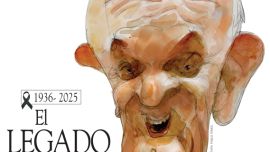The relationship between Argentina's incoming and outgoing governments came under renewed strain Monday, as a rift grew deepened over the resignation of Evo Morales as Bolivia's president.
Alberto Fernández has emphatically denounced the ousting of President Morales, describing it as a "coup" and saying he would offer the Bolivian leader asylum in Argentina. On the opposite side, Mauricio Macri has to date avoided strong statements about the events, limiting himself to saying only that “we’re all worried about Bolivia.”
Macri’s foreign minister, Jorge Faurie, however, went further, adding there “are not the elements” present in Bolivia to consider what happened to be an interruption in the democratic order of the country.
Fernández took issue with that statement on Monday, attacking Faurie's position.
“Faurie is an unfortunate part of Argentina’s diplomatic history,” said Fernández on Monday after attending a launch party for a book at the Center for Cultural Cooperation of the City of Buenos Aires.
partparticipating in a presentation of the book "Politics and elections in Latin America. A progressive guide to electoral campaigns," in the
“There is no army that has liberated its people. There was a coup against the State in Bolivia,” he emphasised.
Fernández also thanked regional leaders Andrés Manuel López Obrador (Mexico), Martín Vizcarra (Peru) y Mario Abdo (Paraguay) for their solidarity in helping Morales flee to Mexico in exile.
The former cabinet chief also detailed his conversation with López Obrador and said the Mexican president offered asylum “generously and rapidly to dozens of Bolivians on the site of his embassy.” He also discussed conversations with the Peruvian president who “facilitated safe air space so that a plane could travel from Mexico to get Evo.”
Since the announcement of Morales' resignation Sunday, Fernández has repeatedly denounced events in Mexico as a coup. According to TN, Fernández called Macri to ask that the government be receptive to whatever request for help Morales issued and, if Macri didn’t want to make a public statement, that Faurie explain there could be a request for political asylum.
The two could not reach an agreement about what to do with their Andean neighbour.
After this dialogue, Faurie released a statement that called on Bolivia to “preserve social peace and dialogue,” but he avoided naming it a coup.
Later, he was clear in expressing the Cambiemos administration's position on Bolivia.
“The element’s aren’t present to define this as a coup against the state,” and he considered that the country was only encountering an institutional crisis.
President Macri said he would wait until there was a detailed report from the Organisation of American States or another international organisation to know what had happened in La Paz and, from there, deliver an official statement.
Fernández, for his part, lauded figures in Macri's coalition that did recognise events in Bolivia as a coup.
“It calms me to see that even within the official coalition of the government, there are people with the democratic dignity that others lack,” he said on his Twitter account, congratulating members of the Cambiemos coalition that have differentiated themselves from the official stance of the government.
Examples include lawmakers Daniel Lipovetzy, Federico Storani, Julio Cobos, Ricardo Gil Lavedra and the Radical Civic Union (UCR) party as a whole.
“If the Armed Forces demanded the resignation of a democratically elected president, it’s a coup,” said Lipovetzky on Twitter in a post that would later be celebrated by Fernandez.
The lawmaker also said it is “necessary that the International Democratic Charter of the OAS be applied to Bolivia and that the organisation intervene.”
– PERFIL/AFP



















Comments